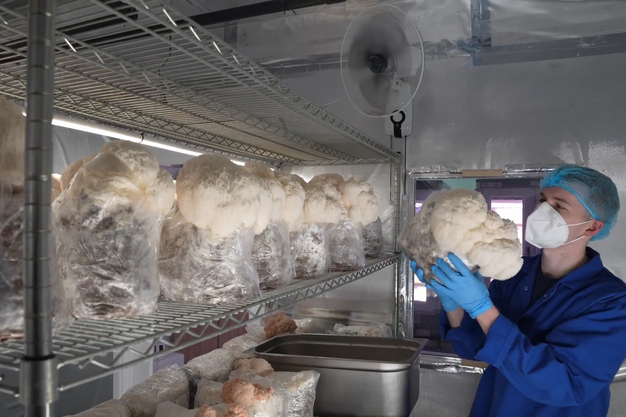At Applegarth Farm in Hampshire, UK, just 45 minutes south of London, Seedleaves has launched a hyper-local vertical farming model that integrates production, retail, and dining under one roof. The 5,000 square foot "vertical barn" houses a restaurant, cookery school, and delicatessen, all supplied directly by crops grown on-site.
"What if the food on your plate didn't travel hundreds of miles to get there?" asks Will Benson, founder of Seedleaves, in a recent video tour of the facility. "This is what food should look like. Produce it where you consume it. That's our mantra."
A networked alternative to monocrop models
Unlike large-scale, monoculture vertical farms optimized for single crops, Seedleaves combines multiple vertical systems to offer a broader crop basket. The company currently represents both InvertiGro (Australia) and Tower Farms (US), blending horizontal cube cultivation and vertical aeroponic towers.
"We're mixing a number of different types of vertical systems to produce a wide range of produce," says Benson. "This is more about smaller, more modular farms selling locally and with a large basket of goods."
In one room, cube-based units grow purple basil, rocket, broccoli micros, and pea shoots for the kitchen. These systems are capable of producing 2.5 to 5 metric tons of microgreens annually, or up to 300,000 seedlings for tower use, according to Benson.
Fruiting crops and leafy greens grown side by side
The adjacent tower room houses squash, cucumbers, parsley, nasturtiums, and multiple varieties of basil. "All of this is for our own restaurant and deli," Benson says. "The basil's going straight into pesto."
While many vertical farms avoid fruiting crops due to complexity and space limitations, Benson believes there's room for experimentation in modular formats. "You can grow anything indoors," he adds. "These systems work brilliantly in glasshouses or even outdoors."
From mycelium lab to meat-free steaks
The farm's third component is dedicated to fungi. Starting in a HEPA-filtered lab and maturing in a six-week incubation chamber dubbed the "mycelium motel," the operation currently grows Turkey Tail mushrooms and produces up to 300 kilos of Lion's Mane each month.
Turkey Tail 
Lion's Mane
"Lion's Mane has been proven in several studies to support cognitive health and may assist with dementia," Benson notes. "But I'm super keen on its culinary potential. It's absolutely delicious, and we're using it in our Lion's Mane steak, a meat-free alternative."
Lion's Mane steak
From farm to plate sustainably
The vertical barn is designed to eliminate traditional supply chain steps. "Instead of importing food or selling to wholesalers who take half the profit and leave a trail of CO₂, we grow on-site and sell direct-to-public," Benson says.
Watch the full tour here.
For more information:
Seedleaves
Will Benson, Founder
[email protected]
www.seedleaves.com
www.applegarthfarm.co.uk
